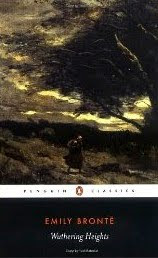
Since I haven't read the Twilight series, and I don't consider myself particularly sappy, I was surprised to find myself siding with (randomly selected) Twilight fan Hayley Mears, whom the Guardian quotes in an online review saying: "I was really disappointed when reading this book, it's made to believe [sic] to be one of the greatest love stories ever told and I found only five pages out of the whole book about there [sic] love and the rest filled with bitterness and pain and other peoples [sic] stories".
"Bitterness and pain" is right. (And all the [sic]s in there are right, too, because this book is pretty [sic].) Essentially, this is the story of two snarling, brutish, semi-wild children who love each other in their animalistic way, but don't get together because one of them, Cathy, thinks she needs to marry someone with class and money. Her dismissal of Heathcliff, the vicious foundling she loves, for Edgar, the wimp who loves her, sets off a chain of about three-hundred pages of slow, conniving cruelty, as Heathcliff labors to destroy everyone involved in the affair, as well as their children, houses, and distant relations.
Academically, there are a few interesting things going on here. Wuthering Heights can be read as an early Victorian response to (or reworking of) Romanticism, and its approaches to nature and love are surprising for the way they show sympathy for a form of rawness that's otherwise unappealing (and uncharacteristic of the period). As a devotee of both the Burkean sublime and Nietzsche, I was interested in the interplay of rough, calamitous nature, the animal, and Heathcliff's slow-burning vengefulness…which all fits partially, but not very neatly (that's the interesting part), under those two moral/aesthetic frameworks.
But while a book's being "interesting" is normally enough to get me to like it, it wasn't enough here. At one point in the novel, Heathcliff expresses a wish to vivisect the other characters, and vivisection is a good metaphor for the novel as a whole. Reading about Heathcliff is like watching a troubled teen slowly cut a wriggling fish apart--you get upset at the cruelty of the thing, but the whole affair doesn't have much dramatic interest; you walk away feeling bored, sad, and wondering what the point of it all was. The novel doesn't have the psychological insight of a Jane Eyre, or the social complexity of a Bleak House. Curious readers, I give this one an "avoid."
Book: Wuthering Heights by Emily Brontë (1847)
Friday, June 18, 2010
Posted by
JMM
at
9:15 AM
|
Labels:
book reviews,
books,
Emily Bronte,
reviews,
Wuthering Heights
